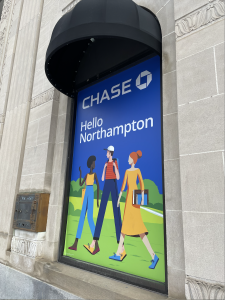Massachusetts and New England just marked the warmest January on record, and our region is nearing the end of what is likely one of its warmest winters yet.
Given the relentless pace of climate change – the ongoing news of extreme weather events, record floods and storms, unpredictable seasons, and vanishing species, with 18 separate billion-dollar weather and climate disaster events across the U.S. in just the last year alone – it is appalling to learn that Chase Bank is expanding into New England and plans to open a branch right here in downtown Northampton.

Of the four giant banks that lend to Big Oil – Chase, Bank of America, Citibank and Wells Fargo – Chase is the biggest investor. According to the Sierra Club, in the years since the Paris Climate Agreement, Chase has been the world’s largest banker of fossil fuels. From 2016 to 2020, it poured more than $316 billion into the fossil fuel industry.
Chase wants us to believe it’s committed to going “green,” citing, for example, its pledge to reach net-zero emissions from its lending and investment portfolios by 2050. But that pledge is only hot air until Chase stops financing the expansion of fossil fuels.
Bill McKibben points out that the offices of the four big banks – including the beautiful old Silverscape Designs building that Chase will occupy – might as well have a giant smokestack coming out the top, to remind us how much carbon they produce when they lend money to expand pipelines and fracking wells.
That’s why people will head to downtown Northampton on Tuesday, March 21, to protest Chase Bank’s funding of climate chaos. Our event (https://bit.ly/ChaseRally) is being organized by many local groups and will be one of scores of nationwide events that day – from Puget Sound to the southern tip of Florida, from Dallas to Washington, D.C. – as people stand up to the big banks that so recklessly fund further development of fossil fuels.
On March 21, we’ll gather at 4:30 p.m. in Pulaski Park for a short, peaceful rally that will feature a few speakers and some singing. Then we’ll march in procession down Main Street, passing two other banks notorious for funding fossil fuel projects, TD Bank and Bank of America.
Our final stop will be the big intersection of King and Main Streets, near the location of the new Chase Bank. We want everyone to know that Chase Bank is enabling the fossil fuel industry and to urge people not to bank at Chase. After all, we have many good, green, local banks and credit unions to choose from.
I don’t know exactly who will come, but here’s what I envision. I imagine that elders like me will be there, people who’ve experienced in our lifetime a dramatic, accelerating rise in global carbon dioxide levels driven by the burning of fossil fuels. When I was born in 1951, the level of CO2 in the air had for millennia never risen above the safe, stable level of 300-310 parts per million.
Today’s level has skyrocketed to over 417 parts per million, pushing the atmosphere into territory not seen for millions of years. Humans now breathe air that our ancestors wouldn’t recognize. Elders will join the rally because we’ve witnessed this unprecedented change and are determined to leave a habitable world to those who come after us. Stopping banks from funding new fossil projects is essential to stabilizing the climate and drawing down emissions.

As I imagine it, parents will come to the rally cradling small children or pushing young ones in strollers. What is fiercer than a mother’s love? We parents want to safeguard the lives and health – indeed, the very future – of our beloved children. We’re willing to devote an hour to confirm that our love for our children and our neighbors’ children means moving our money away from banks that propel climate catastrophe and urging dirty banks to clean up their lending practices.
Students and young adults will be there, knowing that their future is at stake. Many young people are acutely aware of climate grief and anxiety and know that coming together to take action is a path to building a better future.
What’s more, opening a banking account with a green local bank rather than one of the giant banks turns out to be one of the most effective ways we can reduce our carbon footprint.
Faith leaders and members of diverse religions will join the rally because – whatever our tradition – we know that laying waste to the Earth and destroying the web of life violates our values. Faith communities have a long history of pressing successfully for social change, from child labor to women’s rights and abolition to the civil rights movement. We express our religious identity when we commit ourselves to mending a broken world.
Finally, both long-time activists and newcomers will join the rally, shaking off what experts call learned helplessness, the sense that we have no power to change a difficult situation. The truth is that we do have power to imagine a better world and can work together to bring that world into being.
Insisting that banks stop propping up the fossil fuel industry is a task that all of us can embrace. Let’s use our finances to fight climate change.
_______________________________________________________________________________________________________________________________
The Rev. Margaret Bullitt-Jonas is an Episcopal priest who works to advance climate justice for the two Episcopal dioceses in Massachusetts and for Southern New England Conference, United Church of Christ. She lives with her husband in Northampton.
This essay was published on March 14, 2023, as a guest column in the print edition of Daily Hampshire Gazette (Northampton, MA).

